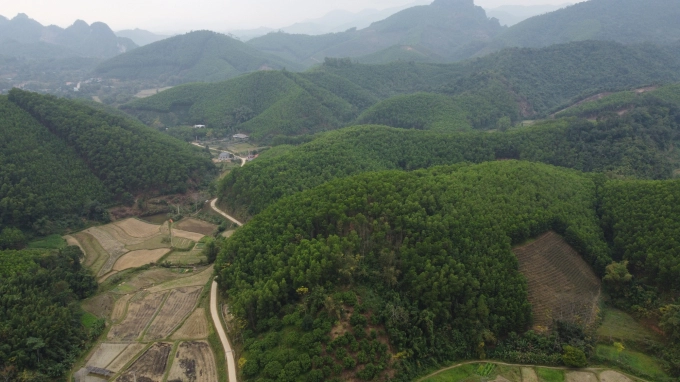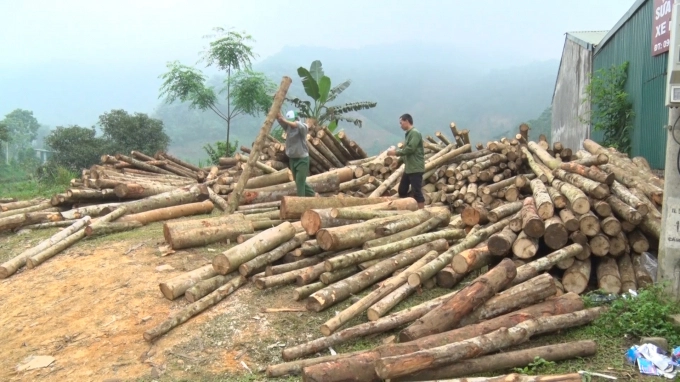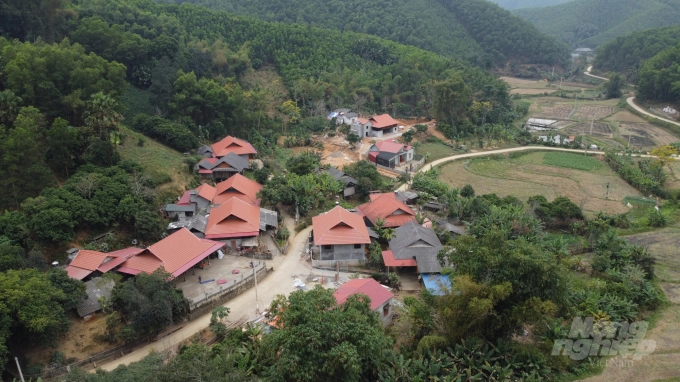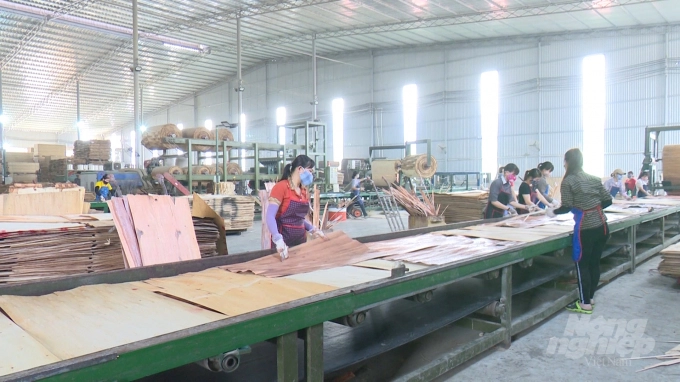June 21, 2025 | 02:42 GMT +7
June 21, 2025 | 02:42 GMT +7
Hotline: 0913.378.918
June 21, 2025 | 02:42 GMT +7
Hotline: 0913.378.918
Bac Kan has a total natural area of 485,996ha of which forests cover 417,538ha, accounting for 86% of the province's nature. In recent years, forest economic development has become a spearhead sector. Sustainable economic development in Bac Kan has drawn much attention from authorities at all levels with the support and participation of all locals. Planting productive forests has become a large development movement in the province with many households having changed from crop cultivation on forest land into afforestation.

Bac Kan is likened to the country’s "green lung". Photo: Toan Nguyen.
Specializing agencies in Bac Kan have implemented many sustainable and effective farming models and developed forest trees with economic value, short production cycle and suitable ecological characters. Afforestation works in recent years always exceed targets. Particularly in 2021, the whole province planted 5,156ha of forests, reaching 144% of a plan set out at the beginning of the year. Bac Kan so far has more than 102,000ha of productive forests.
The forest plantation economy has helped change the habits of local people who used to rely on natural forests by exploiting wood and firewood for their daily life. Thereby, this sector has attracted 60% of households in the area to participate in forestry production activities, creating more jobs and improving life for ethnic minorities and strengthening national unity, stability, security, and social order.
Forestry production contributes to environmental protection, nature and biodiversity conservation, natural disaster reduction, erosion control, water conservation, living environment improvement, and creating revenue from environmental services such as environmental fee collection, CO2 emission reduction, and ecotourism.
Mr. Hoang Van Kien, Deputy Director of Bac Kan Forest Protection Department, said several decades ago, it was very difficult to mobilize people to plant forests. But now, with each ha of forest bringing in an income of over VND100 million, people are very active in afforestation making it always exceeding target at a high level. Forest development has become a routine that after exploiting, locals immediately replant by their own capital.
Fundamental solutions to develop special-use forests have been actively and effectively carried out by the functional forces of Bac Kan. Along with that, forest protection and development have attracted special attention from leaders of the province. In the period from 2009 to 2020, in two poor districts of Ba Be and Pac Nam along, about 18,000 households have been supported in afforestation, 660 poor families have won contracts to protect and take care of forests.

Afforestation has brought a prosperous life to local people in Bac Kan. Photo: Toan Nguyen.
Every year, tens of billions of dong are allocated to villages in the core zone of Ba Be National Park, and nature reserves for people to build infrastructure. Up to now, dozens of kilometers of concrete roads, water supply, irrigation systems, and bridges have been put into use in the province.
In addition, investment capital in afforestation and forest protection in communities has been transferred directly to groups of local households creating a stable source of income for them in patrolling and protecting the forest. Thanks to policies on the development of special-use forests, people in core zones of national parks and protected areas have raised awareness and responsibility in forest management and protection encouraging locals to proactively denounce and detect Forest Law violations.

Currently, Bac Kan is strongly shifting to large timber plantations with the aim to further enhance the value of planted forests. Photo: Toan Nguyen.
Effective activities in patrolling and controlling forests are regularly conducted by the forest rangers in collaboration with local authorities and communities in the area. Thanks to that, many cases of violations of the Forest Law and many forest fires have been timely detected and handled.
To boost afforestation in Bac Kan, functional agencies and local people have been joining hands in managing, protecting, and developing forests, increasing annual forest coverage areas, contributing to ensuring environmental security, preventing natural disasters, maintaining water regulation for irrigation, and conserving genetic resources and biodiversity.
To boost afforestation in Bac Kan, functional agencies and local people have been joining hands in managing, protecting, and developing forests, increasing annual forest coverage areas, contributing to ensuring environmental security, preventing natural disasters, maintaining water regulation for irrigation and conserving genetic resources and biodiversity.

Life in many villages in Bac Kan province has been improved due to the protection and development of forests. Photo: Toan Nguyen.
Green forests in Bac Kan have made a great contribution to the development of the country, preserving water sources and purifying the air for the lowland areas. Afforestation has brought benefits to local people and become the province’s key economic sector. According to experts, afforestation is very suitable for poor households who only have to plant in the first year and take care of it in the second year. After 6 years, they can earn hundreds of millions of dong/ha.
Most people in Bac Kan province have planted forests on their lands, many of whom even have been through the third and fourth forest cycle so now can gross high income from afforestation. For example, in Cho Moi district, the number of households with an income of over VND200 million/cycle (usually 7-8 years) is uncountable, while those in rural areas can even earn billions of VND from the forest.

A timber processing factory in Thanh Binh Industrial Park, Cho Moi district, Bac Kan province. Photo: Toan Nguyen.
Forestry production has brought remarkable economic efficiency to Bac Can with a total timber output per year reaching about 260,000 cubic meters which can be sold at an average price of VND800,000/m3 or more. Thus, the total value obtained from forests has reached more than VND200 billion/year. Wood products from planted forests are often processed for export to increase added value. The export turnover of plywood and slats in 2021 reached more than VND900 billion.
Bac Kan has many wood processing factories, spreading along national highways and provincial roads through districts and cities, most concentrated in Cho Moi district, where Thanh Binh Industrial Park is located.
Translated by Linh Nguyen
![Turning wind and rain into action: [9] Digitizing hydrometeorological data in response to climate change](https://t.ex-cdn.com/nongnghiepmoitruong.vn/608w/files/news/2025/06/17/z6704423696987_15fd32ffc26d590d204d520c9dac6786-nongnghiep-165943.jpg)
(VAN) Farmers have begun accessing hydrometeorological applications to adjust their cropping schedules, aiming to ensure productivity and adapt to climate change.
![Turning wind and rain into action: [8] Real-time salinity detection and early warning technology](https://t.ex-cdn.com/nongnghiepmoitruong.vn/608w/files/news/2025/06/17/z6704423696987_15fd32ffc26d590d204d520c9dac6786-nongnghiep-151127.jpg)
(VAN) Thanks to the integration of modern hydrological-hydraulic models, remote sensing technologies, and artificial intelligence, the accuracy of hydrological forecasting has significantly improved.
![Turning wind and rain into action: [7] Early disaster warnings help marine farmers minimize losses](https://t.ex-cdn.com/nongnghiepmoitruong.vn/608w/files/news/2025/06/17/z6704423696987_15fd32ffc26d590d204d520c9dac6786-nongnghiep-142942.jpg)
(VAN) In recent years, thanks to early disaster warnings and forecasting, marine farmers in Khanh Hoa province have been able to reduce risks and losses, thereby improving production efficiency.
![Turning wind and rain into action: [6] ‘Four on-the-spot’ disaster management software](https://t.ex-cdn.com/nongnghiepmoitruong.vn/608w/files/news/2025/06/17/e5a48259d6a262fc3bb3-nongnghiep-183800.jpg)
(VAN) By simply activating the scenario on the disaster management software, the relevant authorities immediately know how many households need to be evacuated, where to evacuate them to, and by what means of transportation…
![Turning wind and rain into action: [5] Hue applies modern technology in disaster forecasting](https://t.ex-cdn.com/nongnghiepmoitruong.vn/608w/files/news/2025/06/17/z6704423696987_15fd32ffc26d590d204d520c9dac6786-nongnghiep-093938.jpg)
(VAN) In Hue city, modern technology has recently been applied in meteorological and hydrological forecasting and warning, helping to reduce the damage caused by natural disasters.

(VAN) A cutting-edge farming technique being implemented on an experimental ranch in Arizona's Sonoran Desert has already saved a billion gallons of water over five years, according to Civil Eats.

(VAN) Poultry and pig production and the environment can be boosted through enhanced water technology, according to new research.